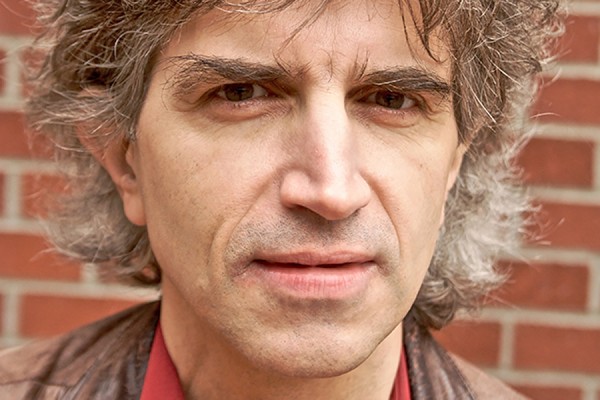 Creative writing professor Louis Cabri has released a fourth book of poetry. Photo by Roy Miki
Creative writing professor Louis Cabri has released a fourth book of poetry. Photo by Roy Miki
Fiction and non-fiction, more often than not, represent perceptions according to recognizable narrative conventions, says Louis Cabri. “And poetry can do that, too,” he adds.
Dr. Cabri is an associate professor in the Department of English and Creative Writing, teaching poetry, literary theory, and creative writing. The first stanza of his poem “Your Attentional Annuity” suggests his point:
Murmurings among the living
Room dribblers
Distracting your attention from me
While the fire’s in there happy shining up the chimney’s ass
A fugitive discreetly appears
At window, chuckling, wheezing — a John Candy —
Spring
“But poetry can also bring to representation more than representation itself, and more than the represention of perception,” Cabri continues. “Poetry can speak to the mechanics of sense-making, in slo-mo and in close-up for reader’s pleasure, laughter, and more.
“By the ‘mechanics’ I mean to include the effects and affects of the language — which continues to socialize us daily, even as we sleep, from all the directions language comes — in grammatical struggles, social struggles, cultural, cognitive, technological, institutional, historical — all struggle, really.”
In “The Bromeliad,” he writes:
the way language use isn’t linear
history, but the way the history
encrusting language users
rotted off them, the information Google, the ruling Grace, collects, flake by flake,
data exhaust from the speech organ
till the thick stalk stuck —
while its measurements are toured
for a factory with the right fit —
like a stake
Cabri explores the mechanics of perception and more in his fourth book-length collection, Hungry Slingshots, published this month by New Star Books.
 Publisher Rolf Maurer describes the work as “a suite of poems that return a piquant critique of the excess that stands in for contemporary normality.
Publisher Rolf Maurer describes the work as “a suite of poems that return a piquant critique of the excess that stands in for contemporary normality.
“Cabri’s recent work opens up the resonating chambers of constraints inherited by poetry convention and makes our oldest literary genre vibrate in new ways and in unexpectedly contemporary directions,” says Maurer.
“Rolf is referring to an old poetic form I revive in one of the 13 poems,” Cabri says. “I re-jig the eight-line triolet form by returning to a time when the form was not decorous parlour entertainment which it had become by the 19th century, and instead provided people with lively social commentary. It’s the book’s title poem, a discontinuous narrative sequence of 64 triolets loosely structured around a translation from the poetry of Saint-Amant who was writing during the Fronde civil war, ‘the bourgeois revolution that wasn’t’, as it’s been called, in late 1640s France.”
He notes that triolets were a popular vehicle for social satire: set to folk tunes, sung in parks, and on the pickpocket’s bridge to the royal grounds.
“Jazz clarinetist François Houle recorded one for me and it has a beautiful, melancholic tonality, still feudal but secular and topical to the root,” Cabri says. “You can find anonymous triolets and related forms online thanks to Nicholas Hammond’s work. ‘Beaucoup estoient affriolés / Avec ses petits triolets.’ Many were fired up by these little triolets. I love that, the contrast between big and little, further layered in the French by a sonorous delicacy.”
The following is a sample triolet from the sequence “Hungry Sling Shots” in Cabri’s Hungry Slingshots:
Tycoon plants straightface
What a plant, not green
Loophole loop holds loop / hole over sight
Tycoon plants straightface
Fake noose, loop holds
Trending word lookups, clemency, treason
Tycoon plants straightface
What a plant, not green
Cabri explains that he retains the distinctive triple repetition but dispenses with end-rhymes, “and notice,” he adds, “it’s an assembly of fairly autonomous lines, no overarching syntax.”
His interest in the triolet and in the Fronde (it means ‘slingshot’) developed out of research for an essay on the poetry of Ted Greenwald [1942-2016].
“I sought help from Justin Lariviere (director of the UWindsor Math and Stats Learning Centre) to explain the permutational math in a repeating pattern Greenwald uses. Ted Greenwald is the first to completely reinvent the triolet in over half a millenium by connecting it to the four-beat stress-meter stanza of rhythm and blues.”
And Cabri’s triolets?
“Contrary to what most poetry handbooks assume, these old poetic forms were never actually ‘fixed’ forms. I’m not repeating a template, even a template of what translation is. In my book, the triolet hosts a formal experiment in refracting present conditions through past. The sequence tests how far the authoritarian impulse in democracy has residual roots in king worship,” he says.
“The other poems and poem-sequences in Hungry Slingshots arrive at our present moment, too. But their arrival takes place in differing ways, through different concerns than the ones I’ve mentioned here.”
Cabri’s previous poetry books include Posh Lust (2014), Poetryworld (2011), and The Mood Embosser (2001). The next project, he says, is to gather some of his essays on contemporary poetry.
“It is difficult to get the news from poems, as William Carlos Williams famously wrote, in, of course, a poem,” Cabri says. “As a critic, also teacher, I can’t wait to help show the news that is poetry.”
Originally delayed by the coronavirus pandemic, Hungry Slingshots is now available for shipping. A virtual book launch is planned. Learn more on the New Star Books website.
